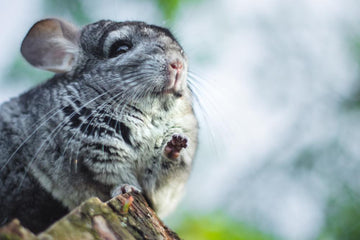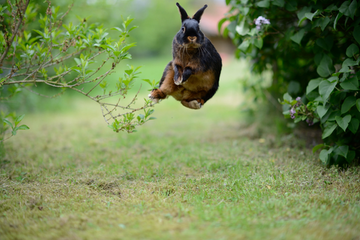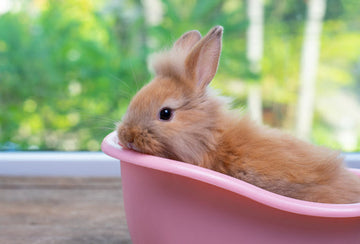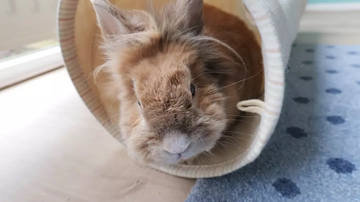When Are Rabbit Vaccinations a Must For Your Pet?
Rabbits are known for their charming and playful personalities. They often hop around, explore their surroundings, and enjoy interaction with their human companions. So, when your once-active bunny starts to hide, it can be a cause for concern. But fret not, as this change in behavior isn't uncommon, and it usually has specific reasons behind it. Let’s look at 8 common reasons.
Click Here For a Guide to Understanding Your Rabbits Diet.

1. Feeling Under the Weather
One of the first things to consider when your bunny starts hiding is their health. Rabbits are masters at hiding signs of illness or discomfort. If your bunny is not feeling well, they may seek a quiet, sheltered spot to rest and recover. Common health issues in rabbits that can lead to hiding include dental problems, gastrointestinal issues, or even external parasites.
What to Do: If you notice a significant change in your bunny's behavior, consult your veterinarian promptly. Early detection and treatment of health issues are crucial for your pet's well-being.
2. Stress and Anxiety
Rabbits are sensitive creatures, and they can easily become stressed or anxious. Changes in their environment, routine, or even the introduction of a new pet can trigger these feelings. When stressed, bunnies often seek solitude and hide as a way to cope with their emotions.
What to Do: Identify and eliminate stressors in your bunny's environment. Ensure they have a secure and quiet space where they can retreat to if needed. Gradually introduce any changes or new pets to reduce anxiety.
3. Feeling Threatened
Rabbits are prey animals, and their survival instincts are finely tuned. If they sense a potential threat, they may hide to stay safe. This can include loud noises, the presence of unfamiliar animals, or even sudden movements.
What to Do: Create a safe and secure environment for your bunny. Ensure their enclosure has hiding spots and is located away from noisy or chaotic areas of your home. Be gentle and calm in your interactions with your pet.
4. Hormonal Changes
Unspayed or unneutered rabbits can exhibit different behaviors due to hormonal changes. Female rabbits, in particular, may become more territorial and seek a hidden spot to establish as their own.
What to Do: Consider spaying or neutering your rabbit if they are not already. This can help reduce hormonal-driven behaviors and improve overall temperament.
5. Molting
Rabbits periodically shed their fur; a process known as molting. During molting, your bunny may feel uncomfortable or itchy, prompting them to groom and hide more than usual.
What to Do: Gently brush your rabbit during molting to help remove loose fur and ease their discomfort. Ensure they have a cozy place to relax during this time and enjoy helping and bonding with your bun.
6. Temperature Sensitivity
Rabbits are sensitive to temperature changes. If your home becomes too hot or too cold, your bunny may seek shelter in a cooler or warmer spot to regulate their body temperature.
What to Do: Maintain a comfortable temperature in your rabbit's living space. Provide them with options for cooling down or staying warm as needed.
7. Socialization and Trust Building
Sometimes, a bunny hiding might simply be a sign that they need some space or time to themselves. This is especially common in rabbits that are still building trust with their human caregivers.
What to Do: Respect your bunny's need for solitude when they seek it. Slowly work on socialization and trust-building activities to strengthen your bond over time.
8. Old Age
As rabbits age, they may become less active and more inclined to rest and hide. This is a natural part of the aging process.
What to Do: Ensure your senior bunny has a comfortable and safe place to hide and rest. Provide appropriate senior rabbit care, including a diet tailored to their needs.
If your bunny is suddenly hiding, it's essential to observe their behavior and consider potential underlying causes. While some hiding behaviors are normal and temporary, others may signal underlying health or environmental issues. Always monitor your rabbit's well-being closely, and don't hesitate to consult a veterinarian if you have concerns about your pet's behavior or health.
Remember, each bunny is unique, and understanding their individual needs and preferences is key to providing them with a safe, happy, and healthy home.
At Rabbit Hole Hay we strive to provide with you educational information on how you can best to care for your small pet, but the above blog is more for informational purposes with a few tips - not veterinary advice. If you have concerns about your rabbit's health or behavior, we recommend consulting a qualified veterinarian for guidance.

Can Chinchillas Get Wet? Risks Explained

Height Dangerous for Rabbits: Safety Tips

How to Bathe a Rabbit: Safely and Calmly







